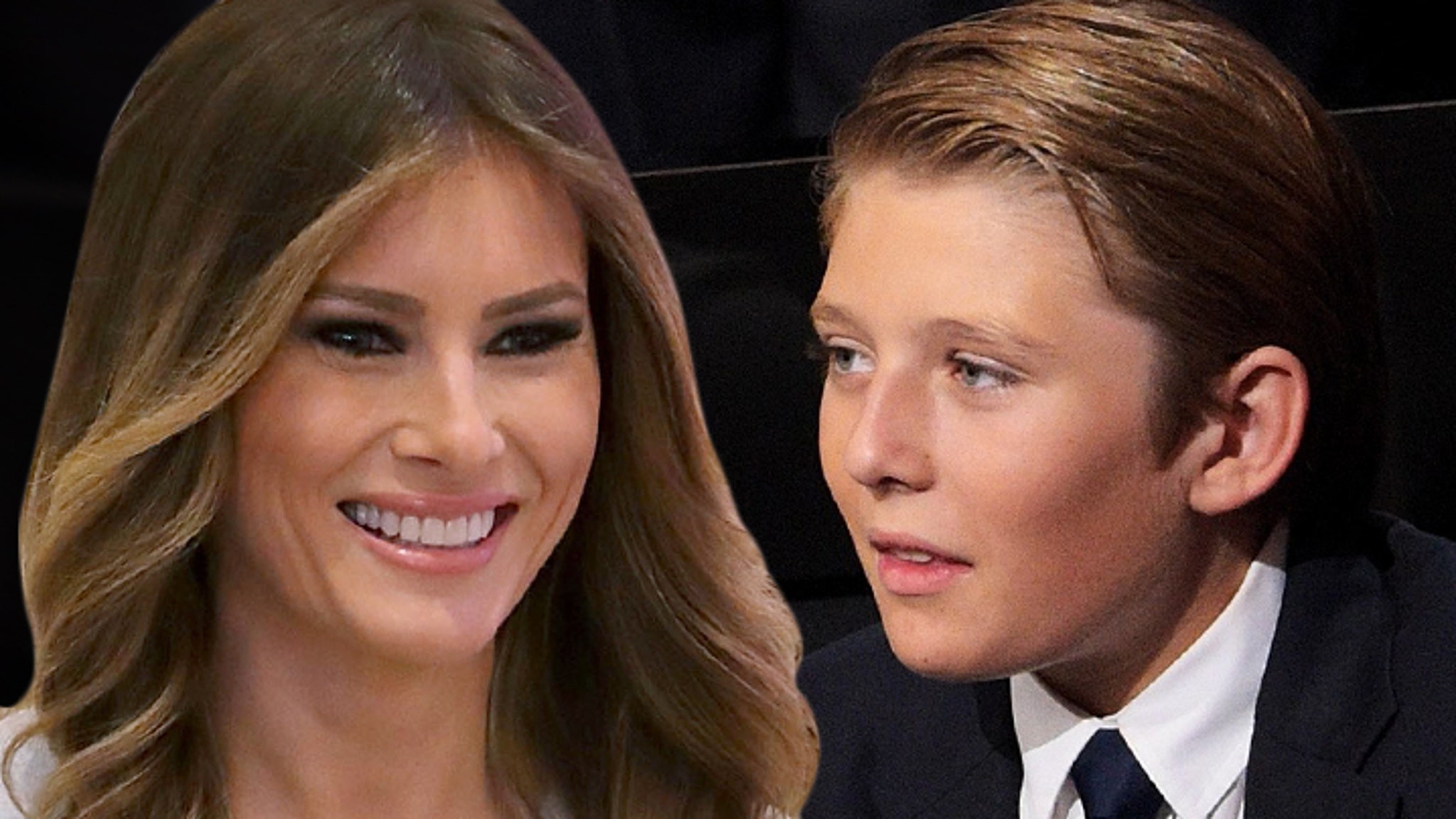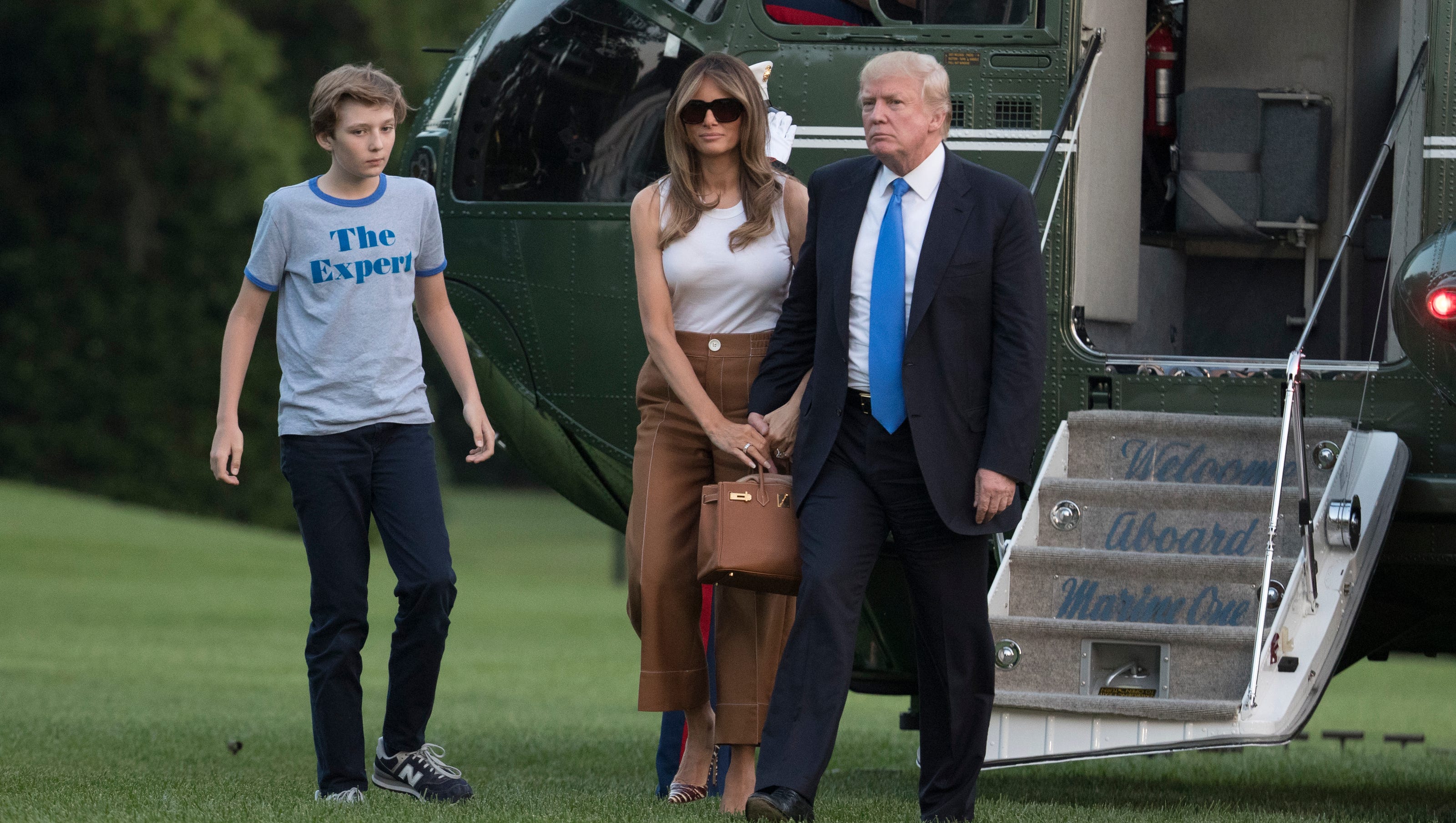Barron Trump, the youngest child of former U.S. President Donald Trump and Melania Trump, has been a subject of public curiosity since his early years. Among the many topics surrounding him, discussions about Barron Trump autism have garnered significant attention. While there is no official confirmation regarding his neurodevelopmental condition, speculation has persisted in media and public discourse. Understanding autism and its potential impact on individuals like Barron can foster greater empathy and awareness. This article delves into Barron's life, the autism spectrum, and the broader implications of how society perceives neurodiversity.
Born on March 20, 2006, Barron Trump grew up in the spotlight as part of one of the most high-profile families in the United States. As a public figure, his actions, appearance, and behavior have often been scrutinized by the media and the public. Conversations about Barron Trump autism have emerged from observations of his demeanor in public settings and interactions. However, it’s essential to approach such discussions with sensitivity and respect, avoiding assumptions or labeling without credible information. Autism is a complex spectrum, and each individual’s experience is unique, making it critical to focus on understanding rather than speculation.
In this article, we aim to shed light on Barron’s life, provide a deeper understanding of autism, and explore how public figures like Barron can influence societal perceptions of neurodiversity. By examining Barron Trump autism in the context of broader discussions about autism awareness, we hope to encourage thoughtful dialogue and promote inclusivity. Whether you’re seeking factual information or simply curious about Barron’s journey, this article offers a comprehensive exploration of the topic while emphasizing the importance of compassion and informed perspectives.
Read also:Discovering Naturi Naughtons Husband A Remarkable Journey Of Success
Table of Contents
- Barron Trump Biography: A Glimpse into His Life
- What is Autism? Understanding the Spectrum
- How Does Autism Affect Children Like Barron Trump?
- Why Does Public Perception of Barron Trump Autism Matter?
- How Can We Support Neurodiversity in Society?
- What Role Do Celebrities Play in Autism Awareness?
- What Are Some Common Misconceptions About Autism?
- Frequently Asked Questions About Barron Trump Autism
Barron Trump Biography: A Glimpse into His Life
| Full Name | Barron William Trump |
|---|---|
| Date of Birth | March 20, 2006 |
| Parents | Donald Trump and Melania Trump |
| Education | Attended private schools in New York and Florida |
| Notable Family Members | Ivana Trump (stepmother), Ivanka Trump (half-sister), Eric Trump (half-brother), Tiffany Trump (half-sister) |
Barron Trump’s life has been anything but ordinary. As the youngest child of a billionaire businessman turned U.S. President, Barron has grown up in an environment that blends luxury, privilege, and immense public scrutiny. Born in Manhattan, New York, Barron spent much of his early years in the bustling city before relocating to Washington, D.C., during his father’s presidency. Despite his family’s prominence, Barron has maintained a relatively low profile, often seen as a quiet and reserved child.
Throughout his childhood, Barron has attended prestigious private schools, where he reportedly excelled academically. His mother, Melania Trump, has played a significant role in shaping his upbringing, emphasizing values such as discipline, education, and privacy. While Barron’s public appearances have been limited, his presence at official events, such as his father’s inauguration, has drawn attention. Observers have noted his calm demeanor and unique style, which have occasionally sparked discussions about Barron Trump autism, though no official statements have been made by the family regarding his neurodevelopmental status.
Beyond the glitz and glamour of his family’s lifestyle, Barron’s story reflects the challenges faced by children growing up in the public eye. Balancing the demands of a high-profile family with the need for personal development and privacy is no easy feat. Whether or not Barron identifies as part of the autism community, his journey highlights the importance of understanding and supporting all individuals, regardless of their circumstances.
What is Autism? Understanding the Spectrum
Autism Spectrum Disorder (ASD) is a neurodevelopmental condition characterized by differences in social communication, behavior, and learning. The term "spectrum" underscores the wide range of abilities and challenges experienced by individuals with autism. Some may excel in specific areas, such as mathematics or music, while others may face difficulties with verbal communication or sensory processing. Understanding autism requires recognizing its diversity and avoiding stereotypes that oversimplify its complexities.
One of the key features of autism is difficulty with social interactions. Individuals on the spectrum may find it challenging to interpret nonverbal cues, maintain eye contact, or engage in reciprocal conversations. These traits are often mistaken for shyness or disinterest, leading to misunderstandings. Additionally, repetitive behaviors or intense focus on specific interests are common among autistic individuals. For example, a child might develop an extraordinary knowledge of dinosaurs or trains, showcasing their unique strengths and passions.
Diagnosing autism typically involves a comprehensive evaluation by healthcare professionals, including psychologists, pediatricians, and speech therapists. Early intervention can significantly improve outcomes, helping children develop essential skills and adapt to their environments. However, it’s crucial to remember that autism is not a disease or something that needs to be "cured." Instead, it’s a natural variation in human neurology that enriches our collective experience. By embracing neurodiversity, we can create a more inclusive society that values the contributions of all individuals, including those like Barron Trump autism discussions often revolve around.
Read also:Jet Lis Fortune Unveiling The Martial Arts Legends Net Worth
How Does Autism Affect Children Like Barron Trump?
Autism manifests differently in every child, and its impact can vary widely depending on factors such as age, environment, and available support systems. For children like Barron Trump, who grow up in high-profile families, the challenges of autism may be compounded by the pressures of public life. While there is no confirmed diagnosis of Barron Trump autism, exploring how autism might affect a child in his position sheds light on the broader experiences of neurodivergent individuals.
One of the primary areas affected by autism is social interaction. Children on the spectrum may struggle to navigate social norms, such as making eye contact, interpreting facial expressions, or engaging in small talk. These challenges can lead to feelings of isolation or frustration, particularly in environments where social expectations are high. For a child like Barron, who has attended elite private schools and participated in formal events, these situations might present additional hurdles.
On the other hand, many autistic children exhibit remarkable strengths, such as exceptional memory, creativity, or problem-solving skills. They may develop intense interests in specific subjects, becoming experts in their chosen fields. For example, a child fascinated by architecture might spend hours studying building designs or constructing elaborate models. These passions can serve as sources of joy and accomplishment, helping children build confidence and self-esteem. By focusing on strengths rather than limitations, families and educators can empower autistic children to thrive.
Why Does Public Perception of Barron Trump Autism Matter?
The public’s perception of Barron Trump autism plays a significant role in shaping societal attitudes toward neurodiversity. High-profile figures like Barron often become focal points for discussions about autism, whether or not they identify as part of the community. These conversations can either promote understanding and acceptance or perpetuate harmful stereotypes and misinformation. Understanding why public perception matters is crucial for fostering a more inclusive and compassionate society.
One reason public perception is so impactful is the influence of media representation. News outlets, social media platforms, and entertainment channels shape how people view autism and neurodivergent individuals. When discussions about Barron Trump autism emerge, they can either highlight the diversity of the autism spectrum or reduce it to oversimplified narratives. For instance, portraying autism solely as a challenge or deficit overlooks the unique strengths and contributions of autistic individuals. On the other hand, accurate and respectful portrayals can challenge stereotypes and inspire empathy.
Public figures like Barron also have the potential to raise awareness about autism and advocate for greater inclusion. By normalizing conversations about neurodiversity, they can encourage others to embrace differences and support initiatives that benefit autistic individuals. However, this requires a careful balance between curiosity and respect. Speculating about someone’s neurodevelopmental status without evidence can be invasive and harmful. Instead, focusing on promoting autism acceptance and understanding can create a more positive impact.
How Can We Support Neurodiversity in Society?
Supporting neurodiversity involves creating environments where individuals with autism and other neurodevelopmental conditions can thrive. This includes fostering inclusivity in schools, workplaces, and communities while challenging societal norms that marginalize neurodivergent individuals. By embracing neurodiversity, we can build a world that values differences and empowers everyone to reach their full potential.
In educational settings, supporting neurodiversity begins with recognizing each student’s unique needs and strengths. Teachers can implement strategies such as individualized learning plans, sensory-friendly classrooms, and peer mentoring programs to accommodate diverse learners. For example, providing visual aids or allowing breaks during lessons can help autistic students stay engaged and succeed academically. Additionally, promoting awareness among classmates can reduce bullying and foster a culture of acceptance.
Workplaces also play a critical role in supporting neurodiversity. Employers can adopt inclusive hiring practices, offer flexible work arrangements, and provide training to educate staff about autism and related conditions. Companies like Microsoft and SAP have launched initiatives to recruit and support neurodivergent employees, demonstrating the value of diverse perspectives in driving innovation. By prioritizing inclusivity, organizations can create environments where everyone feels valued and respected.
What Role Do Celebrities Play in Autism Awareness?
Celebrities have a unique ability to influence public opinion and drive social change, making their involvement in autism awareness campaigns particularly impactful. When public figures like Barron Trump autism discussions arise, they bring attention to the condition and encourage conversations about neurodiversity. However, the extent and nature of their influence depend on how they choose to engage with the topic.
One way celebrities contribute to autism awareness is by sharing personal stories. For instance, actors, musicians, and athletes who have autistic family members often use their platforms to educate others and advocate for acceptance. These personal narratives humanize the autism experience, helping to break down barriers and reduce stigma. By speaking openly about their journeys, celebrities can inspire others to do the same, creating a ripple effect of understanding and support.
Additionally, celebrities can leverage their resources to fund research, support organizations, and promote policy changes that benefit the autism community. For example, hosting charity events or partnering with advocacy groups can raise significant funds and awareness. While Barron Trump himself has not publicly addressed autism, his family’s prominence highlights the potential for influential figures to make a difference. By using their visibility responsibly, celebrities can help create a more inclusive and compassionate society.
What Are Some Common Misconceptions About Autism?
Despite growing awareness, misconceptions about autism persist, often perpetuated by stereotypes and misinformation. These misunderstandings can hinder efforts to support autistic individuals and promote inclusivity. Addressing these misconceptions is essential for fostering a more accurate and compassionate understanding of autism.
One common misconception is that autism is a disease or something that can be "cured." In reality, autism is a natural variation in neurology, not a medical condition requiring treatment. While therapies and interventions can help individuals develop skills and adapt to their environments, the goal is not to eliminate autism but to support individuals in living fulfilling lives. Viewing autism through this lens shifts the focus from deficits to strengths, celebrating the diversity it brings to society.
Another misconception is that all autistic individuals share the same traits or abilities. The autism spectrum is incredibly diverse, encompassing a wide range of experiences and challenges. For example, some individuals may be nonverbal, while others excel in communication. Similarly, sensory sensitivities, social preferences, and intellectual abilities vary widely. Recognizing this diversity is crucial for avoiding generalizations and ensuring that support systems are tailored to individual needs.
Frequently Asked Questions About Barron Trump Autism

